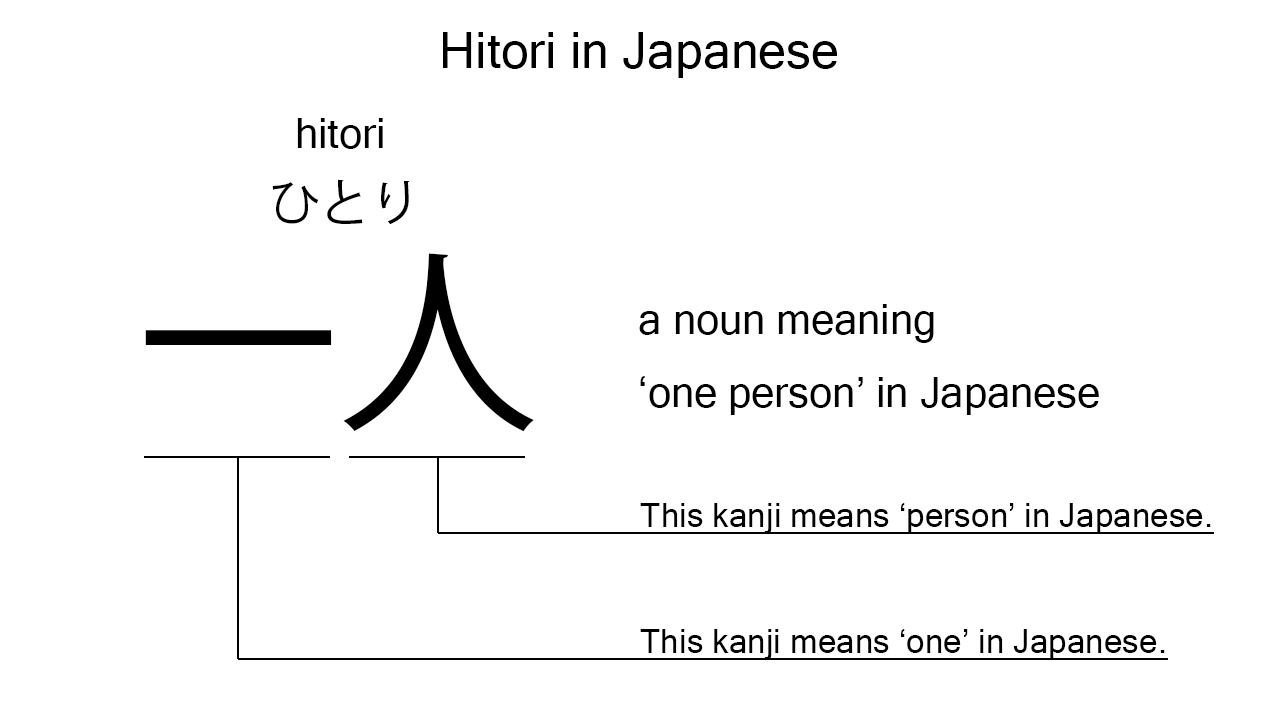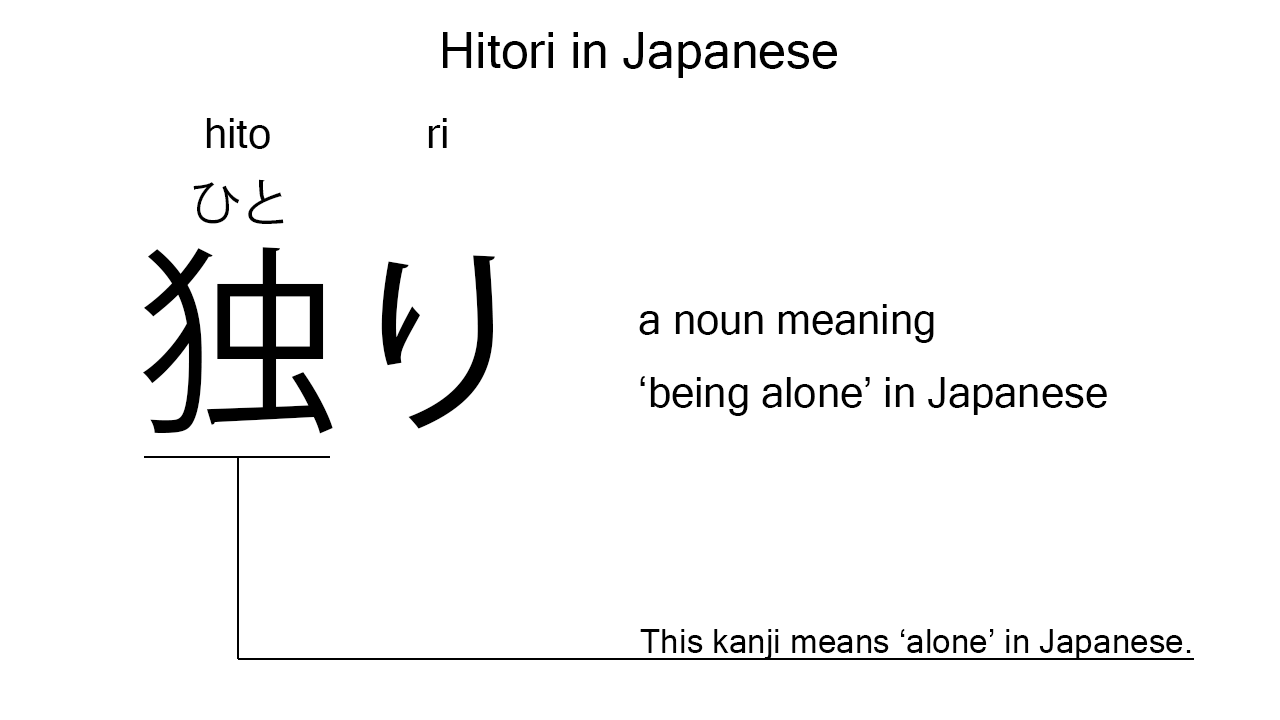What does “hitori” mean in Japanese?
Native speakers say “hitori” to mean ‘one person’ or ‘alone’ in Japanese. Its meaning can vary depending on the kanji expression used. In this blog post, therefore, I will explain this word together with its two different kanji expressions. And also, I will explain how to use it through example sentences. My explanations would help Japanese learners understand “hitori” more clearly. Then, let’s get started!
Contents
Hitori to mean ‘one person’
Let me start with the first kanji expression.
- hitori – 一人 (ひとり) : a noun meaning ‘one person’ in Japanese.
The first kanji character, “一”, is widely used as a numeral to mean ‘one’ in Japanese; the second, “人”, is used to mean a ‘person’ or ‘people’. So, this kanji expression literally means ‘one person’ in Japanese. What the kanji characters express is completely in line with the actual meaning.

Depending on the context, however, this kanji expression could also mean ‘alone’ in Japanese. Being one person can sometimes mean being alone.
So far, I’ve explained the definition and meaning of “hitori” together with the first kanji expression. Then, let me explain how to use it through the example sentence below.
Example #1: how to say “one person” in Japanese
hitori no chikara ga sekai wo kaeru – 一人の力が世界を変える (ひとりのちからがせかいをかえる)
The power of one person can change the world.
Below are the new words used in the example sentence.
- no – の : a case particle joining two nouns. Normally, the first one can work as a modifier to describe the second. In the example, this works to join “hitori” and “chikara”. The formed phrase literally means ‘the power of one person’ in Japanese. Word orders in Japanese and English are different, but the role of this case particle is very similar to that of the English preposition, “of”.
- chikara – 力 (ちから) : a noun meaning ‘power’ in Japanese.
- ga – が : a case particle used to make the subject word or the object word in a sentence. In the example, this is used after the noun phrase, “hitori no chikara”, to make the subject in the sentence.
- sekai – 世界 (せかい) : a noun meaning ‘world’ in Japanese.
- wo – を : a case particle used to make the object word in a sentence. In the example, this is used after “sekai” to make the object in the sentence.
- kaeru – 変える (かえる) : a verb meaning ‘to change’ in Japanese.
This is a typical usage of this type of “hitori”. When we want to say “one person” in Japanese, this noun is a very good option.
Hitori to mean ‘alone’
Next, let me explain the second kanji expression of “hitori”.
- hitori – 独り (ひとり) : a noun meaning ‘being alone’ in Japanese. This can also work as an adverb to mean ‘alone’ in Japanese.
The kanji character, “独”, is often used to mean ‘alone’, ‘unique’, ‘single’, or such in Japanese. So, this expression literally means ‘alone’. When we want to mean ‘alone’ in Japanese, we should use this kanji expression.

Then, let me explain how to use this type of “hitori” through the example sentence below.
Example #2: how to say “alone” in Japanese
kanojo wa hitori de arui ta – 彼女は独りで歩いた (かのじょはひとりであるいた)
She walked alone.
Below are the new words used in the example sentence.
- kanojo – 彼女 (かのじょ) : a pronoun meaning ‘she’ in Japanese.
- wa – は : a binding particle working as a case marker or topic marker. In the example, this works after “kanojo” to make the subject in the sentence.
- de – で : a case particle used to say how someone does something. In the example, this is used after “hitori” to say how she walked.
- arui – 歩い (あるい) : one conjugation of the verb, “aruku“, which means ‘to walk’ in Japanese. In the example, it has been conjugated for the better connection with its following word.
- ta – た : an auxiliary verb used after a verb, adjective, or auxiliary verb to make its past tense form. Probably, this is well known as a part of Japanese ta form. In the example, this is used after “arui” to make its past tense form, “arui ta”.
This is a typical usage of this type of “hitori”. Like in this example, it is often used together with the case particle, “de”, to mean ‘alone’ in Japanese. Of course it can mean ‘alone’ alone, though.
Summary
In this blog post, I’ve explained the definitions and meanings of “hitori” in detail based on its kanji expressions. And also, I’ve explained how to use it through the example sentences. Let me summarize them as follows.
- hitori – 一人 (ひとり) : a noun meaning ‘one person’ in Japanese. These two kanji characters literally mean ‘one person’.
- hitori – 独り (ひとり) : a noun meaning ‘being alone’ in Japanese. This can also work as an adverb to mean ‘alone’ in Japanese. The kanji character, “独”, is used to mean ‘alone’, ‘unique’, ‘single’, or such in Japanese. So, this expression literally means ‘alone’.
Hope my explanations are understandable and helpful for Japanese learners.